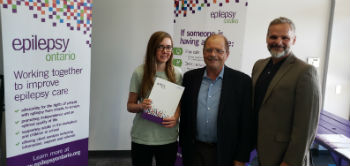By Deron Hamel
Alexandra Law says she hopes to one day use the power of film to help people understand what living with epilepsy is like.
Alexandra, who is currently a student in the media fundamentals program at Sheridan College, says that her goal is to become a fiction writer and she also plans to use her writing talents to create a screenplay about living with epilepsy.
“I would like to shed light on a condition that is very misunderstood,” she says. “Many people fear (epilepsy) and think it’s a one-size-fits-all thing or that it’s untreatable.”
Now 19, Alexandra was diagnosed with infantile spasms when she was seven months old. Alexandra says she has multiple seizures every day.

Living with epilepsy has given Alexandra experiences many others will never know, she says. Living with epilepsy also means Alexandra has not experienced things other people have, she adds.
But one thing Alexandra says she wants people to understand is that having epilepsy is not what defines her. She says she hopes that a film about life with epilepsy would raise awareness of how having a seizure disorder does not have to dominate a person’s life.
“It is simply a part of who I am,” she says. “I want to share my story and the stories of others living with epilepsy through film and get the message out there that people live very full lives with epilepsy.”
Alexandra says what drives her to want to make a film about people’s experiences with epilepsy is the care she has received from doctors, who have tried to understand her epilepsy and control her seizures, as well as the family support she has always had.
“This is an important story to be told,” she says, “and I want to be a part of it.”
Alexandra is one of the recipients of this year’s Osler Epilepsy Scholarship. The $1,500 scholarship, formerly called the OBCL Epilepsy Scholarship, is being offered to six students this year.
Osler Epilepsy Scholarships are awarded each year to exceptional students who have confronted and overcome remarkable barriers in their academic and personal lives due to their epilepsy.
As part of this year’s application process, students submitted a 600- to 900-word essay focused on how they could see themselves helping an epilepsy association or another charitable organization in the future, based on their personal experiences.






